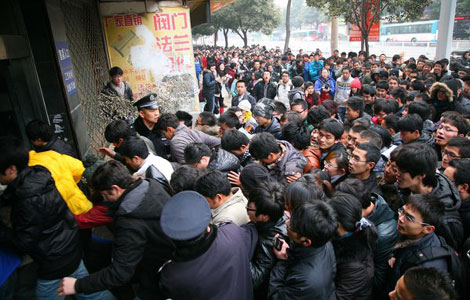|
|||||||||||
BEIJING - Top lawmakers on Wednesday urged the government to issue a policy to ensure farmland is not being wasted as an increasing number of farmers are leaving for cities amid rapid urbanization.
Uyunqimg, vice-chairwoman of the National People's Congress Standing Committee, said it is crucial to ensure arable land be sub-contracted out after its tenant migrates to urban areas for a better life.
The government should issue a policy as soon as possible to make clear that the land, after being contracted to a sub-tenant, will not be abandoned and will only be used for farming, she said in a report to top lawmakers after an investigative trip.
The report follows Premier Wen Jiabao's call on Tuesday, at a conference on next year's rural work, for an end to sacrificing farmers' property rights. Wen also pledged to "greatly increase the share of gains that go to farmers from enhancing the value of land".
To better protect farmers' land property rights, Uyunqimg urged better supervision over the land circulation procedure whereby farmers contract their arable land to others after moving to cities as a way to prevent land waste and help solve the food security issue.
About 242 million migrant workers have left their land for more opportunities and better welfare in urban areas, the Ministry of Human Resources and Social Security said.
The migration, along with other causes, leaves at least 21.5 million hectares of farmland lying untilled in winter in 16 provinces in the southern part of China, according to the statistics from the Ministry of Agriculture.
The top legislature's investigation, however, found that 13.8 million hectares of arable land, 16 percent of the country's total, has been re-contracted to others after the original tenants left.
"Unsatisfactory and irregular operations have been common. Some have only an oral agreement, some were rented under-priced, and some deals were made by village officials without the consent of farmers," Uyunqimg said.
Zhang Xiaoshan, a member of the investigation tour and an expert on China's rural issues, said although the law states that contracted land cannot be retrieved or arbitrarily changed, the current stipulation is "too abstract to implement" and needs revision.
"The loopholes have given way to illegal land sales and use - the top reason for social disputes in rural areas in recent years - so amending related laws is urgent," he said.
Zhang said amending laws related to land rights is on next year's agenda of the top legislature's Agriculture and Rural Affairs Committee.
In a recent land dispute case, hundreds of residents in Wukan, a village of Guangdong province, staged a standoff to oppose the alleged corrupt sale of their collectively owned land to developers. The protest continued into this month and intensified after the elected leader, Xue Jinbo, died in police custody for unidentified causes.
The case later took a U-turn after Zhu Mingguo, deputy Party secretary of Guangdong, said villagers' demands are mostly "reasonable", and should be responded to by rooting out corruption.
China's land tenure system is divided into State-owned land, which is mostly in cities, and collectively owned land, which is mostly in rural areas.
Collectively owned land, or rural land, is prohibited from being sold to developers for commercial use except when the government retrieves the parcel of the land and officially changes the land use.
About 40 percent of local government revenue last year came from land sales, according to China Real Estate Information, a property data and consulting firm.
China Daily
Hot Topics
HIV/AIDS, Egypt protest, Thanksgiving, climate change, global economic recovery, home prices, high-speed railways, school bus safety, Libya situation, Weekly photos
Editor's Picks

|

|

|

|

|

|







